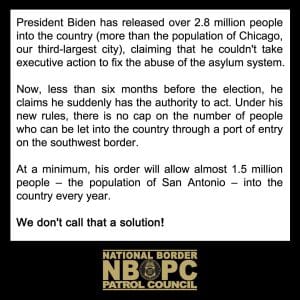The information presented here is intended to serve as broad practical guidance for the National Border Patrol Council union member. This page is not intended to provide technical guidance to union representatives on grievance processing procedures. Union representatives seeking technical guidance should contact their Lead Station Representative or the Vice President assigned to their respective Border Patrol Station.
The basics
Simply put, a pure grievance is a litigation method by which the union seeks to address specific or general alleged violations of the collective bargaining agreement (other grievance types mainly deal with disciplinary actions). Grievances vary in complexity from the most mundane of matters to very intricate, complex, and multi-jurisdictional matters. Although grievances allege a violation of some type in respect to specific negotiated provisions of the contract, that is always not the case. Grievances can actually encompass just about any issue related to conditions of employment. Conditions of employment is a very broad category of issues ranging from locker sizes to deadly force policies. This page is intended to provide information to the union member on how to have their individual claim reviewed for union litigation.
The objective of a grievance is twofold. First, it seeks to protect the negotiated provisions of the contract and the bargaining unit as a whole. Second, it seeks some type of remedy for the affected individual. The remedy may be in the form of a promotion, lost wages, reassignment, detail, or some other method of making the aggrieved party “whole.” Grievances never seek punitive damages as they are not provided for under existing labor law.
What to do if you think you have been aggrieved
-
Document everything related to the suspected grievance.
-
Review the negotiated agreement to see if the Agency violated any sections of the agreement.
-
Contact a certified union representative within 10 days of the alleged grievance (the union only has thirty days from the date of the alleged violation to file a Step I grievance.)
-
The union representative will conduct a preliminary review of the matter. He may ask you to fill out a union complaint form. Failure to complete the form will result in a delay of the processing of your grievance. In many cases, it will result in a “non-review” of your matter.
-
Please note: The Union rarely entertains anonymous grievances.
-
-
The union representative will consult with the lead union representative assigned to your Border Patrol Station.
-
The union representative will respond to your inquiry regarding the weight of your grievance. At that time, he or she will inform you whether or not the grievance will be pursued and on what basis it was accepted or rejected.
-
Once the union has accepted the grievance, only a union representative can modify or withdraw the grievance. Additionally, only the union can seek to settle the grievance.
-
-
The grievance will be processed according to internal union procedures and Article 33 of the contract, beginning with a Step I filing (informal), unless otherwise provided by the contract.
What to do if your grievance request has been rejected by the union:
A grievance may be rejected by the union for many reasons. There may not actually be a violation of the contract or the alleged grievance may be harmful to the good of the membership as a whole. In some cases, your grievance allegation may actually be an Unfair Labor Practice Complaint. Either way, you, as a member of the Union have a right to not only be told the exact reason for a rejection, but to also appeal that rejection to higher union authorities.
If you feel that your request for a grievance has been inappropriately rejected, do the following:
-
Immediately contact the lead union representative of your Border Patrol Station.
-
If he or she is not available, contact an National Border Patrol Council, Local Executive Board member as soon as possible. Be sure to have the completed union complaint form ready to be faxed upon request.
-
-
Explain your situation using only facts. Also, explain your reasons for disagreeing with the initial determination.
-
Allow a day or two for review of the alleged grievance.
-
A definitive answer, including reasoning, will be provided to you.
-
-
Please note: This appeal procedure is internal and not provided for by law, contract, or any other obligation. There is no appeal procedure beyond this step. The decision of the higher union official is final.


